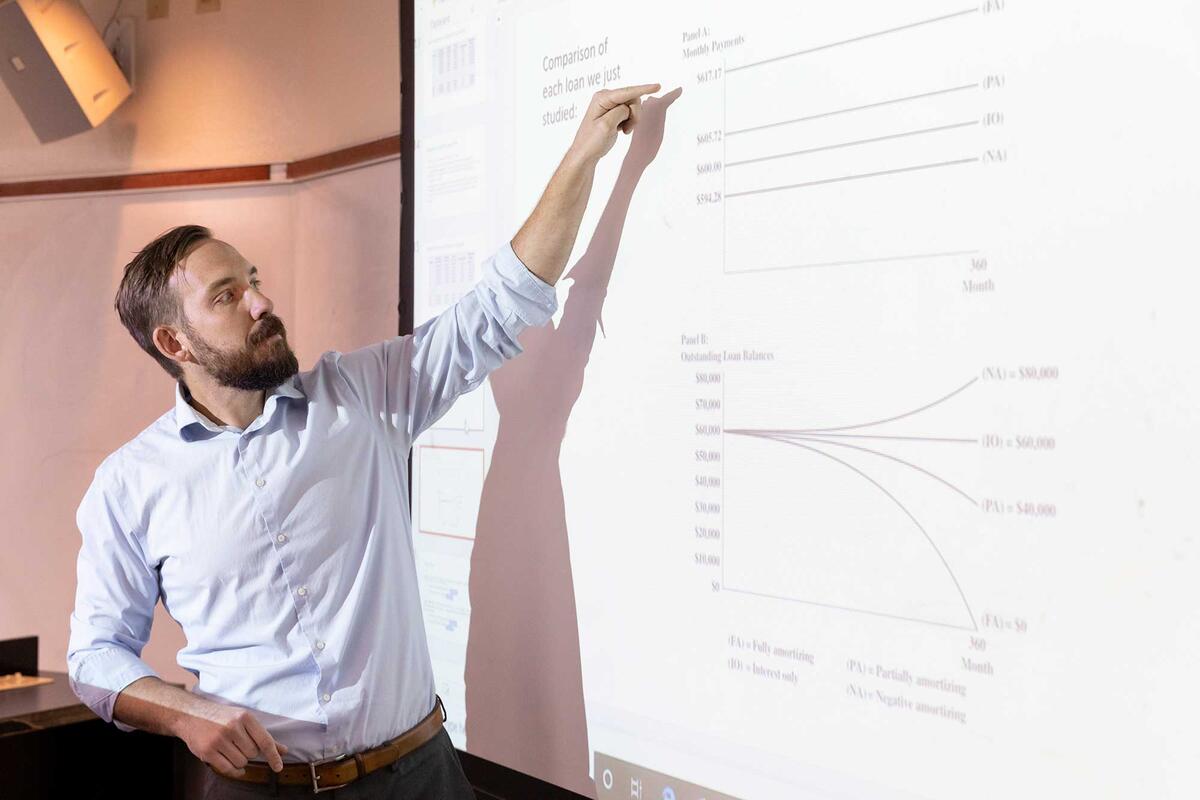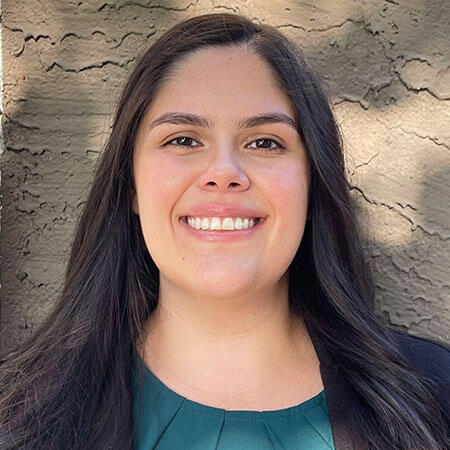
Master's Degree in Economics
Overview
Our graduate program combines rigorous training in quantitative business economics with hands-on experience in data modeling and analysis. We provide the knowledge and resources to transform students into competitive industry professionals who can obtain high-quality, in-demand jobs that require proficiency in data-driven analytics.
5 Reasons to Get a Master’s Degree in Economics at UNLV
- Increase Your Earnings – Economics ranks among the highest-paying master’s degrees. Typical career salaries have shown to exceed those of other business disciplines and many traditional STEM programs.
- Expand Your Career Options – The versatile skills developed through this program will help you easily pivot across different sectors, including but not limited to tech, healthcare management, policy analysis, and government.
- Enhance Your Value as a Job Candidate – The ability to make informed data-driven decisions is in high demand across all industries. By mastering analytical and quantitative methods, you can qualify for jobs seeking analysts or researchers.
- Get the STEM Advantage – Our STEM-designated program makes our graduates valuable in markets that highly value quantitative skills. International students can also qualify for an extended post-degree work authorization in the U.S.
- Set the Stage for a Ph.D. – Professionals considering a doctorate in economics, finance, or other business disciplines can use our program as a launchpad. Refine your skills and fix deficiencies to prepare for your next step.
If you are a UNLV undergraduate student, you may be eligible for our accelerated bachelor’s-to-master’s program.
Stand Out in a Competitive and Ever-Changing World
Thinking like an economist and being proficient in working with data using modern causal and predictive analysis methods – this dual skill set will uniquely position you in the job market and open a wide spectrum of career paths.
Use Generative AI To Your Advantage
A master’s in economics is particularly advantageous now that generative AI excels in complex data analytics. Your understanding of economic theories and principles will provide a critical human context to the interpretation of data, enabling you to ask the right questions, make sense of data, and effectively draw insights. As AI handles the computational heavy lifting, your role evolves to focus on informed decision-making, research design formulation, and innovative problem-solving. This human-AI partnership will enhance your value, ensuring that you remain an irreplaceable driver of meaningful change for your employer, adept at translating data patterns into impactful economic strategies.
Receive Mentorship from Industry Experts
Our faculty are leading experts in their fields who are committed to providing personalized mentorship to each student. Our program offers a supportive and inclusive community where students can collaborate and learn from each other.
“Our faculty work hard to equip students with advanced data modeling skills and the ability to analyze complex economic problems. Positioned at the intersection of economics, applied econometrics, and data science, our graduates are well prepared to emerge as dynamic professionals adept at harnessing data and economic insights to drive impactful decisions in various sectors, from government policy to corporate strategy.”Emir Malikov, Ph.D.
Lee Professor of Economics and Graduate Coordinator

Career Options
Break Into Multiple Industries
Given the versatility of our curriculum, the master’s in economics prepares students for diverse professional careers. Coupled with sought-after proficiency in data analysis, our graduates will have mastered fundamental problem-solving and analytical skills making them a valuable asset to any team or organization, including in industries such as:
- Banking and finance
- Consulting
- Data science
- Forecasting
- Market research
- Non-profit
- Public policy
- Risk management
Land a Role That’s Perfect For You
With a graduate degree in economics, professional career paths are myriad. Envision yourself making a difference and excelling in roles such as:
- Data Analyst: Modeling and interpreting complex datasets to guide corporate strategy.
- Financial Risk Analyst: Predicting future market trends to protect assets and reputations.
- Public Sector Economist: Evaluating and drafting economic policy.
- Economic Data Strategist: Working in the fast-paced world of investment banking where your insights could influence multi-million-dollar investment portfolios.
- Development Economist: Applying your knowledge in the non-profit sector where you help foster economic development and reduce poverty.

“My graduate economics training at UNLV has been instrumental in my professional success. The program's in-depth focus on econometric modeling has allowed me to tackle complex challenges and stand out in the workplace. I have create spatial regression models to optimize product placement, derived real-time demand curves using customer data, and combined logit and machine learning techniques to create sophisticated predictive models that have directly led to strategy changes and measurable revenue growth. This solid foundation has been crucial in empowering me to approach business problems creatively and methodically.”Tony Foresta
Senior Data Scientist, MA'18
Admission Requirements
The program accepts graduates from all undergraduate disciplines. To be considered, applicants must have the following:
- Bachelor's degree from an accredited four-year institution in the United States or an approved equivalent.
- Minimum GPA of 2.75 for the bachelor’s degree or 3.00 for the last 60 credit-hours.
- Proof of English proficiency (International Students).
- Undergraduate coursework in the following:
- Calculus or mathematical economics, or equivalent.
- Statistics or econometrics, or equivalent.
- Note: The Economics Department practices a holistic approach to reviewing applications. As such, we may accept alternative evidence of the demonstrated mathematical/statistical maturity in lieu of quantitative coursework requirements.
- Undergraduate coursework in economic theory is highly recommended but not required.
- GRE/GMAT (optional effective Fall 2024)
Program Structure
Our program is structured to train students to become effective economic practitioners and business leaders. We provide them with practical skills in advanced economic modeling, data analysis, and cutting-edge quantitative methods necessary to excel in today's data-driven business and public policy environments.
- Requires 30 credit-hours (10 courses), allowing students to customize electives based on their interest or career choice.
- Can be completed in as little as 12 months, if starting in the fall semester.
- Expects new students to enroll in a required quantitative methods boot camp, ECO 740, online during the last summer term (July/August) before the fall semester.
- Offers most classes during late-afternoon and evening hours, convenient for both working and full-time students.
The core economics curriculum includes courses in:
- Quantitative methods for economics
- Microeconomic theory
- Macroeconomic theory
- Econometric approaches to causal analytics
- Advanced econometric methods
- Data-driven forecasting methods for business
- Seminar in economic research
In addition to the coursework, the master’s in economics requires completion of a culminating capstone experience. The capstone may entail completing one of the following:
- An instructor-supervised empirical group project (the default option)
- An individual professional research paper under the supervision of a faculty member (subject to the department’s approval)
- An approved professional internship that aligns with the program’s learning objectives (subject to the department’s approval)
The Economics Department also offers the Accelerated Bachelor’s-to-Master’s program that enables high-achieving undergraduate UNLV students to start on their graduate degree in Economics. The program allows them to enroll in approved master’s-level courses in economics which can fulfill economics elective requirements for the BA or BSBA in Economics. Then, assuming formal admission to a master’s program, the graduate requirements attached to these courses will be effectively waived.
The intention of the Accelerated Program is to allow current undergraduate students to obtain a Master’s degree via an accelerated route requiring fewer credits, thus shortening time to degree. For more information, interested UNLV undergraduate students should inquire at economics.gradcoord@unlv.edu.
Application Deadlines
Fall Term:
May 1 – International applicants
June 15 – Domestic or permanent resident applicants.
Spring Term:
Oct. 1 – International applicants
Nov. 15 – Domestic or permanent resident applicants.
Summer Term:
This program does not admit students for the summer term.
Note: When possible, we encourage prospective students to consider a fall start for the most cohesive educational experience. Beginning in the fall aligns you with the standard academic cycle and offers a seamless integration into the program's curriculum. While we ensure that spring admits receive a high-quality education and support, the course offerings and many program-specific events are primarily designed with a fall start in mind.
“I chose to pursue an M.A. in economics because it is a versatile degree that teaches you how to generate research and projects that create value in a world where value is subjective. The skills I've gained from this program have turned out to be very lucrative!”Meghan Azevedo
Analytics Manager, MA'19

Program Advisors Contact
Lee Business School
Department of Economics
Emir Malikov, Ph.D.
Lee Professor of Economics and Graduate Coordinator
702-895-2792
emir.malikov@unlv.edu
Prospective Student Contact
Lee Business School
Graduate Student Services
702-895-3655
LEEogss@unlv.edu
Catalog Information
Visit our Degrees Directory to view our catalog information.